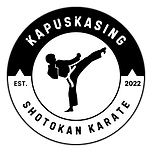
FAQ
Shotokan Karate is a traditional Japanese martial art focused on discipline, respect, physical fitness, and self-defense. It combines kihon (fundamentals), kata (forms), and kumite (sparring).
Students gain confidence, discipline, self-defense skills, improved fitness, and respect for themselves and others.
Our classes are open to children, teens, and adults of all skill levels. No prior martial arts experience is required.
We welcome students starting from 7 years old and up. Younger children may be considered depending on focus and maturity.
Classes are hosted twice a week on Tuesday and Thursday at École Catholique Jacques Cartier.
Youth classes: 6:00 PM
Adult classes: 7:00 PM
Classes are led by Sensei Paul Côté, founder of Kapuskasing Shotokan Karate, along with assistant instructors.
Yes! Parents are welcome to watch classes. We encourage family involvement and support.
We run two sessions per season:
Fall session: September to December
Winter/Spring session: January to April
The cost is $140 per session. In addition, there is a mandatory $30 insurance fee per session for each student.
Child uniform (gi): $30
Adult uniform (gi): $40
Family discounts are available — please contact us for details.
We accept cash, e-transfer, and cheque for membership fees and equipment purchases. Payments can be made monthly or in advance. Family discounts are available.
Dojo etiquette is an important part of Shotokan Karate. It teaches respect, discipline, and proper behavior in the dojo. Students should follow these guidelines:
Bowing: Bow when entering and leaving the dojo, and when addressing instructors or senior students.
Respect: Show respect to instructors and call them Sensei, fellow students, and the dojo itself. Listen attentively and follow instructions carefully.
Cleanliness: Keep uniforms (gi) clean and neat. Practice good personal hygiene.
Punctuality: Arrive on time for class and be ready to start. Late arrivals should bow before joining.
Safety: Practice control at all times. Avoid reckless movements that could injure yourself or others.
Focus: Pay attention during instruction, avoid distracting behavior, and stay engaged in exercises.
Shoes: Remove outdoor shoes before entering the dojo. Only wear designated indoor shoes if needed.
Personal conduct: No swearing, roughhousing, or disruptive behavior. Maintain a positive attitude and encourage peers.
Equipment: Take care of all personal and dojo equipment. Return gear to its proper place after use.
Communication: Speak politely to instructors and peers. Ask questions respectfully when needed.
Honor: Demonstrate humility, patience, and perseverance in training.
.png)
